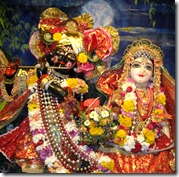 “When one's intelligence, mind, faith and refuge are all fixed in the Supreme, then one becomes fully cleansed of misgivings through complete knowledge and thus proceeds straight on the path of liberation.” (Lord Krishna, Bhagavad-gita, 5.17)
“When one's intelligence, mind, faith and refuge are all fixed in the Supreme, then one becomes fully cleansed of misgivings through complete knowledge and thus proceeds straight on the path of liberation.” (Lord Krishna, Bhagavad-gita, 5.17)“I can drink you under the table…Boom, Boom! I can handle shot after shot of the hardest liquor and not be fazed in the least bit…After drinking so many beers within a few hours, I don’t even get slightly drunk.” Oddly enough, in social circles the ability to hold one’s liquor is considered a sign of manliness, a skill or ability that should be sought after. This mindset is a little strange because the whole aim of intoxication is to escape from the senses. One who has trouble reaching the state of illusion after much intake of alcohol surely shouldn’t be praised for their ability, for they have difficulty in achieving the end-goal. Being capable of holding large amounts of liquor within the body is akin to being able to withstand multiple blows to the head by a hammer. If we said, “I’ve tested that it takes about 10 hard blows from a hammer to my head before I get knocked out”, would that be considered an accomplishment? Irrespective of how long it takes, isn’t the final state, that of unconsciousness, a detrimental one? The ego, which is part and parcel of the material body, would be better served finding a more tangible accomplishment or ability to hang its hat on, a skill which not only represents true strength and advancement, but also gives others a proper example to follow.
 Delving further into the realm of social drinking, the tests for fitness tend to focus on the individuals who do drink regularly and how long it takes them to reach inebriation. The formula for comparison is fairly straightforward. Whoever can handle the most liquor without becoming intoxicated is deemed the best drinker. But when we apply a little logic, if the ultimate objective is to escape from the senses, shouldn’t the individual who gets drunk on say one beverage be considered superior? Let’s apply the same concept to a work environment. Say we have one worker who constantly needs attention, time off, and cajoling from the boss to get their work done. Then we have another worker who doesn’t require any supervision at all. They not only get their work completed on time, but they are barely even noticed by the boss due to their quiet demeanor and high level of confidence.
Delving further into the realm of social drinking, the tests for fitness tend to focus on the individuals who do drink regularly and how long it takes them to reach inebriation. The formula for comparison is fairly straightforward. Whoever can handle the most liquor without becoming intoxicated is deemed the best drinker. But when we apply a little logic, if the ultimate objective is to escape from the senses, shouldn’t the individual who gets drunk on say one beverage be considered superior? Let’s apply the same concept to a work environment. Say we have one worker who constantly needs attention, time off, and cajoling from the boss to get their work done. Then we have another worker who doesn’t require any supervision at all. They not only get their work completed on time, but they are barely even noticed by the boss due to their quiet demeanor and high level of confidence.Obviously the second worker is superior because they are more efficient. The ability to produce at equal or higher levels with a minimal intake of resources equates to a higher efficiency. It is not surprising that amongst those who regularly take to drinking the rules for efficiency get reversed. The man who requires more intake of alcohol to reach the stated objective somehow gets superior status, while the truly efficient drinker is deemed a lightweight. The Vedas, the ancient scriptures of India, describe this entire material world and its varieties of engagements and allures as coming from a tree whose branches are inverted. The root of the tree is at the top and the growth continues downwards. The top is considered the divine heavenly realm, a place that knows no loss or diminution. There are also branches that extend upward, and they represent the transcendental realms where the Supreme Personality of Godhead, in His various Vishnu forms and also His original form of Shri Krishna, resides alongside His eternally liberated associates.
“The branches of this tree extend downward and upward, nourished by the three modes of material nature. The twigs are the objects of the senses. This tree also has roots going down, and these are bound to the fruitive actions of human society.” (Lord Krishna, Bhagavad-gita, 15.2)
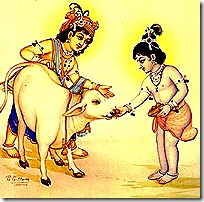 When In Krishna’s association there is no need for intoxication, as the spiritual senses are constantly energized through acting out roles choreographed by the Supreme Director Himself. In one area of the imperishable realm, Krishna is playing with His cowherd friends on the pasturing grounds. They play games familiar to normal school children, except at the center is Krishna. They even play the pass around game, where one boy’s lunch is taken away and then passed around amongst the other children, leaving the boy fearful that he will not get his lunch back. Then there are wrestling matches with Krishna, who is so kind that He allows His friends to win and feel as if they are superior to Him.
When In Krishna’s association there is no need for intoxication, as the spiritual senses are constantly energized through acting out roles choreographed by the Supreme Director Himself. In one area of the imperishable realm, Krishna is playing with His cowherd friends on the pasturing grounds. They play games familiar to normal school children, except at the center is Krishna. They even play the pass around game, where one boy’s lunch is taken away and then passed around amongst the other children, leaving the boy fearful that he will not get his lunch back. Then there are wrestling matches with Krishna, who is so kind that He allows His friends to win and feel as if they are superior to Him.But the most beautiful aspect of the spiritual world known as Goloka Vrindavana, which is the topmost upward branch of the inverted tree, is the sound that permeates the land, an audible vibration that emanates from the magical flute of Krishna, who is thus known as Muralidhara, or the wielder of the flute. If the cows are going astray or if there is any temporary disturbance, Krishna can simply play His flute and all His dear friends will be enamored and satisfied to their hearts’ content. There is no sound in any world, mundane or spiritual, higher or lower, that compares to the intoxicating notes produced by Krishna’s flute. This sound is the essence of spiritual life; it carries the sublime bliss that comes with the direct association of the most attractive, original and ever-merciful form of the Supreme Spirit.
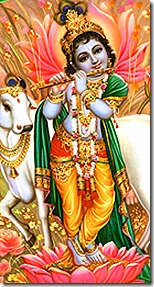 But upon the living being’s descent to the material world, the inverted tree springs downward branches that bring attachment and a reversal of sound logic and reasoning. Rather than enjoy the natural highs that fill the air in Krishna’s realm, man is left to search for illusory escapes from the senses. To play on the field that manifests on the lower side of the tree, the soul requires a dress, a sort of temporary spacesuit. This body is composed of the material elements of earth, water, fire, air and ether. The body can have fire? Science has established that the living human being has an internal temperature of 98.6 degrees Fahrenheit. For this temperature to be maintained there must be natural heat within the body, for when the environment takes on the same temperature, we consider it to be very warm. The element of fire can also be absent in some forms of body; hence the existence of cold-blooded species.
But upon the living being’s descent to the material world, the inverted tree springs downward branches that bring attachment and a reversal of sound logic and reasoning. Rather than enjoy the natural highs that fill the air in Krishna’s realm, man is left to search for illusory escapes from the senses. To play on the field that manifests on the lower side of the tree, the soul requires a dress, a sort of temporary spacesuit. This body is composed of the material elements of earth, water, fire, air and ether. The body can have fire? Science has established that the living human being has an internal temperature of 98.6 degrees Fahrenheit. For this temperature to be maintained there must be natural heat within the body, for when the environment takes on the same temperature, we consider it to be very warm. The element of fire can also be absent in some forms of body; hence the existence of cold-blooded species.“The living entity in the material world carries his different conceptions of life from one body to another as the air carries aromas.” (Lord Krishna, Bg. 15.8)But even more important than the gross elements surrounding the conditioned soul are the subtle elements of mind, intelligence and ego. Due to the inverted nature of the material world, the ego of the embodied being is considered false; something the drinking example very nicely illustrates. The subtle elements subsist from life to life, as the outer coverings are discarded in favor of new ones at the time of death. As long as the predominant desires are similar to the nature of the lower realm, that of being opposite to reality, bodies are continually composed and discarded.
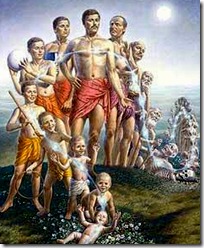 Since the ego is always present, there is no reason to attempt to artificially eliminate it. The key to finding the root of the inverted tree is to purify desire, which can be facilitated through directing the ego to the proper area. In the conditioned state, man takes himself to be the ultimate enjoyer. Hence he takes pride in accomplishments related to the personal self. Yet even the drinker who can hold their liquor must eventually renounce their ability at the time of death. Indeed, they had no say so in the type of body they received at the time of birth, who their parents were, or what type of surroundings they grew up in. Even their ability to drink large amounts of alcohol was acquired through much endeavor. They had to have money to purchase liquor, find ways to get to the drinking saloon, and be fortunate enough to remain alive after repeated nights of drinking.
Since the ego is always present, there is no reason to attempt to artificially eliminate it. The key to finding the root of the inverted tree is to purify desire, which can be facilitated through directing the ego to the proper area. In the conditioned state, man takes himself to be the ultimate enjoyer. Hence he takes pride in accomplishments related to the personal self. Yet even the drinker who can hold their liquor must eventually renounce their ability at the time of death. Indeed, they had no say so in the type of body they received at the time of birth, who their parents were, or what type of surroundings they grew up in. Even their ability to drink large amounts of alcohol was acquired through much endeavor. They had to have money to purchase liquor, find ways to get to the drinking saloon, and be fortunate enough to remain alive after repeated nights of drinking.Developing an ego off of these abilities is silly because another person can follow the same course of action and reach the same destination. In addition, many people are knocked down during their pursuits by outside forces. The Vedas are so nice that they have correctly identified the three primary sources of misery in this world. One force comes from the demigods, or celestial beings. Known as adhidaivika miseries, these are the pains inflicted by natural disasters such as earthquakes and floods. Then there are adhibautika pains, those emanating from other living entities. We may try to remain as peaceful and kind as we want, but there could always come an outside force, either a terrorist or a deranged lunatic, that rolls into town and wreaks havoc. The third category of miseries is known as adhyatmika, or injuries that are self-inflicted. Not only can the mind cause us great distress by dwelling on miserable experiences and unwarranted fears, but fatal diseases can also crop up from within the body.
Even with the pride of having a certain ability, man is still unable to escape the three sources of misery. Another man may try just as hard in the same field of endeavor, but due to outside forces, an internal disease, or a natural disaster, he is unable to succeed. Would it be correct for the successful individual to attribute his greatness to his ability to escape forces which are so powerful that no man can control them? Obviously this sort of thinking is not very intelligent; hence it is not very wise to develop the ego on abilities and accomplishments that are subject to the three sources of misery.
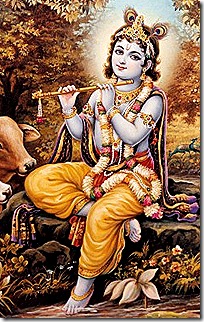 But the ego exists for a reason. The spirit soul craves individuality, as independence is built into its makeup. When the ego is solidified through proper consciousness and activities geared towards pleasing the Supreme Lord, it becomes legitimate and worthy of praise. Taking the same drinking example, if we were to apply the tolerance practice to chanting, the ego could become our best friend. Though there are varieties of prescriptions for achieving spiritual salvation, the ultimate objective is to shift consciousness, to attain a state of mind where all thoughts are dovetailed with the interests of the Supreme Lord through a loving attitude. Though the exact methods can be complex and require expert supervision from a bona fide guru, or spiritual master, the simplest and most effective spiritual practice for the fallen souls of this age is the chanting of the holy names, “Hare Krishna Hare Krishna, Krishna Krishna, Hare Hare, Hare Rama Hare Rama, Rama Rama, Hare Hare”.
But the ego exists for a reason. The spirit soul craves individuality, as independence is built into its makeup. When the ego is solidified through proper consciousness and activities geared towards pleasing the Supreme Lord, it becomes legitimate and worthy of praise. Taking the same drinking example, if we were to apply the tolerance practice to chanting, the ego could become our best friend. Though there are varieties of prescriptions for achieving spiritual salvation, the ultimate objective is to shift consciousness, to attain a state of mind where all thoughts are dovetailed with the interests of the Supreme Lord through a loving attitude. Though the exact methods can be complex and require expert supervision from a bona fide guru, or spiritual master, the simplest and most effective spiritual practice for the fallen souls of this age is the chanting of the holy names, “Hare Krishna Hare Krishna, Krishna Krishna, Hare Hare, Hare Rama Hare Rama, Rama Rama, Hare Hare”.The effectiveness of chanting this mantra lies in the potency of sound. Just as the wonderful sounds emanating from Krishna’s flute in the spiritual sky enrapture the kind associates residing in Vrindavana, the non-different forms of the Supreme Lord in the shape of the sound vibrations of His names can quickly and effectively dissipate the false ego and reignite the original consciousness. As a developed consciousness is the true sign of elevation, one who can find their original state of mind, that of pure Krishna consciousness, will achieve success and find pleasure at every corner in life. The recommendation is that we chant the Hare Krishna mantra as often as possible, but at least through a regulated system known as japa, or quiet meditation.
 Japa is performed on a set of beads that are aligned on a string. There are 108 beads, with one head bead representing Krishna, or God. One round of japa consists of chanting the specific mantra one time on each bead; hence one round equates to 108 recitations of the mantra. To really attack the contaminated consciousness, a dosage of 16 rounds per day of japa is recommended by the spiritual doctors, the Vaishnavas who themselves are always thinking about Krishna and how to please Him. Adhering to this regulation will be difficult, especially in the beginning stages. But the same ego that led to consuming large portions of alcohol can be utilized for developing a strong chanting regimen. While being able to hold your liquor causes negative effects like money lost and the final state of total inebriation, the ability to increase the chanting routine to a large number of rounds each day not only satisfies the ego, but it leads only to a better condition, one where consciousness is forever satisfied.
Japa is performed on a set of beads that are aligned on a string. There are 108 beads, with one head bead representing Krishna, or God. One round of japa consists of chanting the specific mantra one time on each bead; hence one round equates to 108 recitations of the mantra. To really attack the contaminated consciousness, a dosage of 16 rounds per day of japa is recommended by the spiritual doctors, the Vaishnavas who themselves are always thinking about Krishna and how to please Him. Adhering to this regulation will be difficult, especially in the beginning stages. But the same ego that led to consuming large portions of alcohol can be utilized for developing a strong chanting regimen. While being able to hold your liquor causes negative effects like money lost and the final state of total inebriation, the ability to increase the chanting routine to a large number of rounds each day not only satisfies the ego, but it leads only to a better condition, one where consciousness is forever satisfied.With intoxication comes a short-term escape from the senses, followed by a period of great misery. Only in the period of escape can there be any enjoyment, temporary or otherwise. With bhakti-yoga, or devotional service, since the conditioned consciousness is directly attacked, the resulting benefits are felt at all times. Not only does the ego become firmly attached to the practice of chanting, but other aspects of bhakti take hold as well. Those who chant regularly are better equipped to renounce the four pillars of sinful life: meat eating, gambling, intoxication and illicit sex. With every new ability comes further solidification of the ego, as it forms an attachment to something worthwhile and praiseworthy.
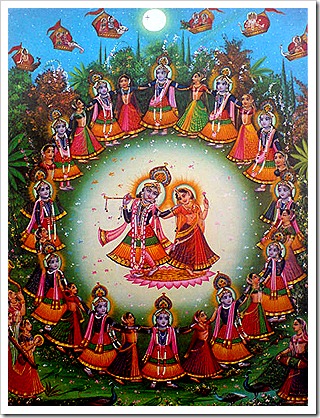 The pinnacle of spiritual life is reached when the ego is so far advanced that not even Krishna can shake the individual from their desire to perform bhakti. Indeed, such a level of devotion is only found in the gopis of Vrindavana and other select exalted figures. Nevertheless, the potential for success is always there. When the ego is firmly attached to Krishna, not even the Lord can stop the devotee from performing their service. The residents of Vrindavana are always tied to Krishna and His satisfaction, so their pride and sense of self-worth come from their confidence in always being able to think of Him. Because of their spiritual tunnel-vision, they never even see the lower portions of the inverted tree that only yield branches and leaves of misery nourished through improper attachment. The perpetually intoxicated man is deemed “wasted” because he loses all faculties in the inebriated state, but one who is always feeling a natural high through Krishna’s association automatically becomes the most capable person, as the purified ego ensures that deviation from the sublime mission of devotional service will never occur.
The pinnacle of spiritual life is reached when the ego is so far advanced that not even Krishna can shake the individual from their desire to perform bhakti. Indeed, such a level of devotion is only found in the gopis of Vrindavana and other select exalted figures. Nevertheless, the potential for success is always there. When the ego is firmly attached to Krishna, not even the Lord can stop the devotee from performing their service. The residents of Vrindavana are always tied to Krishna and His satisfaction, so their pride and sense of self-worth come from their confidence in always being able to think of Him. Because of their spiritual tunnel-vision, they never even see the lower portions of the inverted tree that only yield branches and leaves of misery nourished through improper attachment. The perpetually intoxicated man is deemed “wasted” because he loses all faculties in the inebriated state, but one who is always feeling a natural high through Krishna’s association automatically becomes the most capable person, as the purified ego ensures that deviation from the sublime mission of devotional service will never occur.
No comments:
Post a Comment